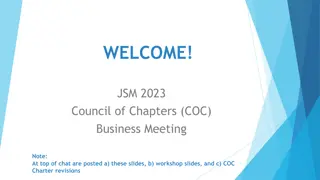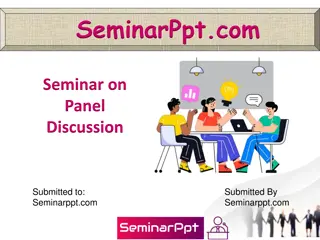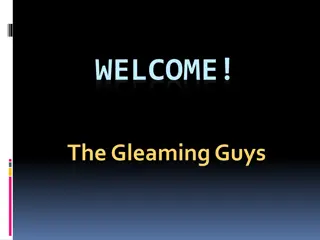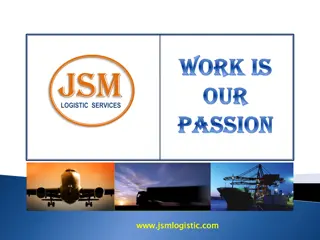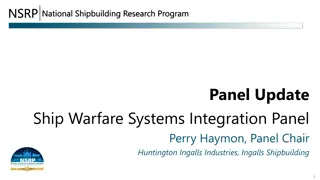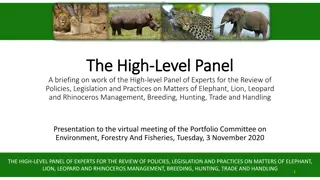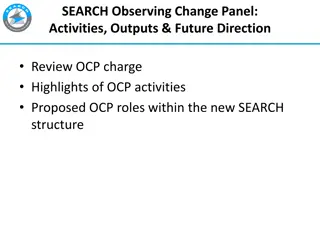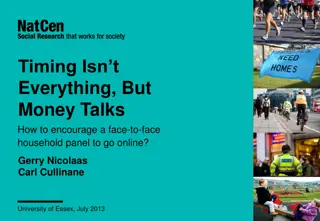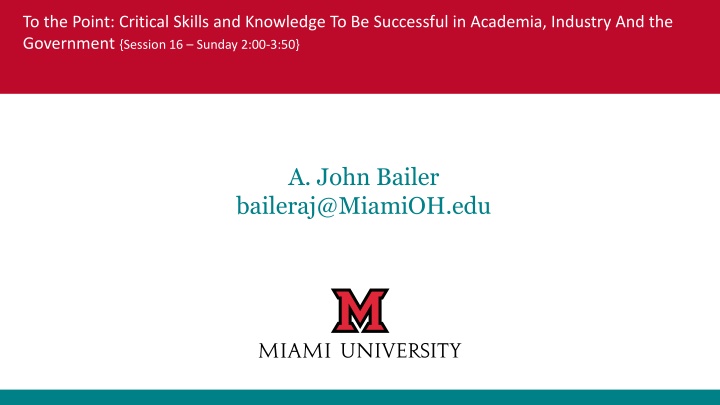
Critical Skills for Success in Academia, Industry, and Government
Explore the key questions regarding success in today's world and how to navigate unexpected career opportunities while staying influential in your organization. Strategies for adapting to constant changes in computational tools and statistical methods are also discussed.
Download Presentation

Please find below an Image/Link to download the presentation.
The content on the website is provided AS IS for your information and personal use only. It may not be sold, licensed, or shared on other websites without obtaining consent from the author. If you encounter any issues during the download, it is possible that the publisher has removed the file from their server.
You are allowed to download the files provided on this website for personal or commercial use, subject to the condition that they are used lawfully. All files are the property of their respective owners.
The content on the website is provided AS IS for your information and personal use only. It may not be sold, licensed, or shared on other websites without obtaining consent from the author.
E N D
Presentation Transcript
To the Point: Critical Skills and Knowledge To Be Successful in Academia, Industry And the Government {Session 16 Sunday 2:00-3:50} A. John Bailer baileraj@MiamiOH.edu
Outline In my remarks, I will consider three ( 1) questions 1. What does it mean to be successful these days? What does it take to be successful these days? (What is success?) [#1] 2. Coming across an unexpected opportunity that led to career path changes that you would not have envisioned otherwise - Have you encountered unexpected opportunity(-ies) that led to career path changes that you would not have envisioned otherwise? [#3] 3. How can you be a positive influencer in your organization? (perils and benefits) [#12] 4. What strategies help deal with / keep pace with the relentless change in computational tools and statistical methods? [#6]
1. What does it take to be successful these days? (What is success?) [#1] 1. Preparation for success? a) Success at different levels individual, organization, profession 2. Predictors of Success? a. Balance b. Calendar Discipline / Focus Deep Work [C. Newport] 3. Evolution of the definition of success over a career?
1.1 What is success? 1. Individual a) b) Continuing to develop as a professional and as a person What metrics do you consider? Reflect your values / goals. Examples: (academic): productive scholar (# pubs, grant $), effective teacher (teaching evals), Example goals: Autonomy and independence Are you happy? Experiencing new challenges? 2. Organization a) Strategic priorities for your organization? How do you contribute? 3. Profession a) Local level? What do collaborators think of statisticians after working with you? Advancing prof? c)
1.2 Predictors of Success a. Balance i. Budgets of money and time are implicit statements of what you value Create time to make sure you take care of what is important (E.g. soccer coach, scout leader) ii. b. Calendar Discipline / Focus Deep Work [C. Newport] i. Do your important work early. ii. Getting through email is not usually a metric of accomplishment can be done twice a day iii. Be disciplined in allocating time
1.2 Predictors of Success a. Calendar Discipline - July 2019 calendar snapshot
2. Have you encountered unexpected opportunity(-ies) that led to career path changes that you would not have envisioned otherwise? [#3] YES!!!! Embrace serendipity Personal History starting point: Ph.D. Biostat (no interest in teaching) Staff Fellow NIEHS (tenurable, career in govt. research) expected to be there for career but visit by UC prof when visiting home Professor A&S Stat Dept. (not biostat or public health) but met aquatic tox colleagues at MU and risk folks at NIOSH (30 years later still collaborating!) Gero colleagues saw I was a biostatistics embedded in Scripps Gerontology Center (20+ years later - still collaborating) Led Quantitative Literacy FLC / team-taught News & Numbers class (10 years ago but the podcast started 6 years ago going strong!) Program review => new dept. => dept. chair (11 years ago and continues)
2. (ctd) unexpected opportunity(-ies) that led to career path changes that you would not have envisioned otherwise? [#3] ENAR RECOM ASA Risk Section involvement / ISI Risk Analysis SIG ASA Board Member (World Stat Day, 175th anniversary of ASA) podcast with journalists www.statsandstories.net ISI Council => Executive Committee => President-Elect (2017-19) Bottom line my career has been be a set of *nevers* (yours may too?): Never expected to collaborate with aquatic toxicologists, gerontologists, occupational health researchers (or team-teach) Never planned to teach and certainly never aspired to be an academic administrator Never gave a minute of thought about being a part of society leadership Never expected to worry about podcast production
3. How can you be a positive influencer in your organization? (perils and benefits) [#12] 1. Be responsive to needs of organization a) Make your organization look good b) What is needed to make your unit be viewed as a critical, central contributor to the success of your organization? c) What can you do to be viewed as a critical, central contributor to the success of your unit and the organization? [Hint: being rigid, nonresponsive and hyper-focused on self are incorrect answers] 2. Have a definition of success that extends beyond you and your local department
3. How can you be a positive influencer in your organization? (perils and benefits) [#12] Example: Think beyond your local unit a) BS DS and Stat <- rename/relabel BS Stat? b) BA DA <- support foundation for new degree? Benefits: Resources are tight good citizens are rewarded Costs: May be a direction that wasn t initially thought interesting
4. What strategies help deal with / keep pace with the relentless change in computational tools and statistical methods? [#6] 1. JSM IOLs; sponsored sessions by sections of particular interest 2. Short courses workshops / tutorials 3. Carve time in calendar to read 4. Twitter 1. data visualization - @flowingdata (Nathan Yau); @EdwardTufte; @eagereyes (Robert Kosara); @nbrgraphs (Naomi Robbins); @AlbertoCairo 2. R tools / Rstudio - @JennyBryan; @winston_chang; @minebockek (Mine Cetinkaya-Rundel); @rstudio; @RLangTip; @hadleywickham
Thank you John Bailer baileraj@miamioh.edu http://www.users.miamioh.edu/baileraj @john_bailer @statsandstories



